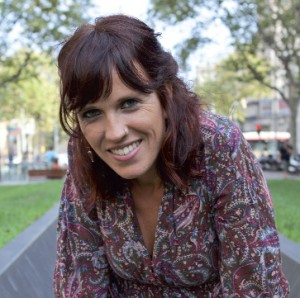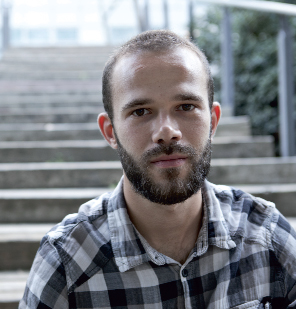Jordi Morató, Neus Ballús and Carlos Marqués-Marcet are young Catalan filmmakers who have come into their own with their first features, which have won them awards and taken them to festivals around the world.
Where does the desire to make films come from? Jordi Morató (Torelló, 1989) had an intuition that it would be a form of learning that intensifies the essence of living: “This is true because you have experiences that would take much longer to occur in your ordinary life.”
Neus Ballús (Mollet del Vallès, 1980) does not recall wanting to be a director, but thinks the idea originated from a desire to share realities that were familiar to her because if she didn’t do it, no one else would: “So I filmed my eighty–year-old grandfather when he wanted to see what could be done with a video camera. And for The Plague I shot in Gàllecs, a kind of no man’s land in the outskirts of Mollet, the village where I’m from. Even though these things are very familiar to me, that doesn’t mean I have a full understanding of who or what it is that I’m filming. Cinema should be for discovering things and then sharing them. For me a film is not worth making if you haven’t learnt anything new by the time it’s over.”

© Fabiola Llanos
Carlos Marqués-Marcet, director of ‘10,000 km’, a title which refers to the distance between Barcelona and Los Angeles.
Carlos Marqués-Marcet (Barcelona, 1983) imagines his vocation stems from the strangeness he felt as a child upon seeing his image reflected in a mirror, although he suspects that it might be just a story made up to explain his attraction to cinema. “I felt that it was me and that it wasn’t me, both at the same time,” he recalls. “It distressed me, but now I know that I have to live with this anxiety: that the self is also the other. And it’s because you feel that you don’t know enough (if you know anything at all) about others (and yourself) that you write, paint or make films. I understand cinema (both as a filmmaker and viewer) to be a mirror that projects an image of you through others, but only to identify yourself in a narcissistic way: it broadens one’s view of oneself, of otherness and of the world. In the mirror it’s you and the other, together. This could also explain why I wanted to make films after seeing Godard’s Vivre sa vie on the telly, albeit on a Garci programme dubbed into Spanish.”
Jordi Morató, Neus Ballús and Carlos Marqués-Marcet each studied Audiovisual Communication at Pompeu Fabra University. All three made impressive debuts with their first feature films, which have won prizes and taken them around the world to present them at festivals.
Morató, the youngest at 25, said he couldn’t have imagined so much success with his film – originally intended as a final degree project about the private jungle founded by Josep Pujiula “Garrell” in a small forest near the village of Argelaguer in the province of Garrotxa.
The title of his documentary is Sobre la marxa. Its title for international distribution – The Creator of the Jungle – bears a resemblance to the way Garrell describes spending forty years building and rebuilding an entire world. “He did everything on the fly, without a preconceived idea, constructing buildings, channelling water, in a place where he played and swam as a boy. He returned there to continue playing. He felt like a real-life Tarzan, free and wild, until the thugs of civilization invaded his paradise rediscovered. To keep them from ruining it, he destroyed it himself. He later rebuilt it until the construction of a nearby dual carriageway once again wreaked havoc on his world. His project destroyed anew, he rebuilt it, erecting towers even higher than the previous ones until a technical report by regional law enforcement put an end to it. In spite of everything, he persevered, this time by digging and even building his own tomb,” says Morató. After having made one of this year’s most outstanding documentaries, Morató continues to study for his MA in Creative Documentary at IDEC-UPF while also working as a camera operator and editor.
Jordi Morató first learnt of that invented jungle from friends. Garrell’s human endeavour fascinated him and prompted him to launch an adventure of his own during which he confirmed his innate intuition: “I’ve also worked on the fly, without any idea to start from, making use of everything I found along the way and struggling to overcome setbacks and discouragement. All this I learnt from Garrell, but mostly I was encouraged by the fact that he took joy in every post he drove into the earth. This is a life lesson and, hence, useful for making films. I’ve also enjoyed each post I used to make this film, and with no prior expectations.” Morató believes that this attitude (this joy and freedom) is what has made the film possible and determined its final form. Also significant were his more than five years of work on the project, not to mention the generous support of many people, in particular producers Isaki Lacuesta and Isa Campo.
The boundary between documentary and fiction
Lacuesta and Campo have also lent their support to Neus Ballús, who, with colleague Pau Subirós, founded the El Kinògraf production company. After producing several short films, the company undertook The Plague, winner of the Best Film prize at the sixth Gaudí Awards. This film, which challenges the boundary between documentary and fiction, tells the story of five people who coincide in the same place to reveal the social realities of immigration, ageing, prostitution and the difficulties of rural life.
“What made The Plague possible? I guess my stubbornness had something to do with it, but of course it really comes down to the collaboration of many people, starting with the protagonists,” says Neus Ballús. “In terms of production, we followed all the steps as we were told to do and, surprisingly, it worked out and we found the resources to make the film. What most made this possible was the idea of presenting a natural view of people and realities, with all of their inherent complexities, which are either ignored or marginalised.”
Neus Ballús is in the process of developing her second feature film, in which she aims to address the difficulties in a relationship of equality between people from wealthy and poor countries, the product of a legacy of colonial exploitation. She says that even though she’s planning to shoot part of the film in Senegal, it deals with a reality she is familiar with: “It’s a difficulty that troubles me because I know it all too well.”
10,000 km from Barcelona
In keeping with his idea that cinema is a mirror reflecting the self and the other, 10,000 km by Carlos Marqués-Marcet is a work of fiction with autobiographical points. These points are reflected in the interest in photography and in the choice of Los Angeles as the female lead character’s residence; the same city where the film’s director spent a year in 2009 on a scholarship from “la Caixa” Foundation.
Although the film frequently cuts back to Barcelona, the site of production and shooting of a film that is mostly set indoors, Marqués-Marcet remained in Los Angeles because he received offers for work and, in fact, he enjoys living there. The same could have happened to Alexandra, the lead character, who also goes to Barcelona on a scholarship and, despite having Skype to communicate with her partner, goes through a crisis in which the physical distance – 10,000 km between the two cities – exposes a deeper crisis.
“I tried to look at how people who love each other grow apart because they desire different things, even though nobody’s to blame,” Carlos Marqués-Marcet told me during a Skype conversation just as I was about to have dinner while he, in Los Angeles, was finishing lunch before resuming editing work for a friend. He has worked as an editor (and still does because he finds working for someone else to be convenient) and will continue to make short films until the opportunity to shoot a feature film arises. “Friendship has made it possible, friends who have collaborated with me and forced me to earn enough money to pay them a little something.”




